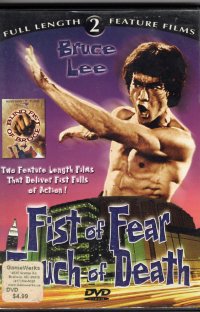 After watching The Forbidden Kingdom and Jade Warrior, I thought I would throw in this DVD which I bought in June 2021 in Branson. I mean, I knew one of the films starred Bruce Li who was supposed to be a successor to Bruce Lee, but what did I just watch?
After watching The Forbidden Kingdom and Jade Warrior, I thought I would throw in this DVD which I bought in June 2021 in Branson. I mean, I knew one of the films starred Bruce Li who was supposed to be a successor to Bruce Lee, but what did I just watch?
Fist of Fear, Touch of Death is not a Bruce Lee film. It was made after he died, and one of the currents is questioning whether he was murdered. I don’t know if the film makers were influenced by Kentucky Fried Movie or similar influences, but this is a jump-cut mockumentary (?) comedy (?) (it’s not funny though) centering on a karate tournament in Madison Square Garden in 1979, where the winner might be the successor to Bruce Lee. You’ve got Fred Williamson playing himself; you’ve got interview excerpts with Ron Van Clief (I’m familiar with both from the Urban Action Cinema Collection). You have a couple other martial artists who might be real or might be actors doing demonstrations. You also have a sparring match for the title at the end. In the middle, you have a fictionalized “biography” of Bruce Lee based on two films chopped and redubbed: one a samurai film purportedly depicting Lee’s Chinese samurai [sic] great grandfather, a mighty warrior, and the second a film starring a young Bruce Lee redubbed and cut to show him studying kung fu against his parents’ wishes. All of it is narrated by a sports reporter Adolph Caesar who does not appear to have been a sports reporter.
So is it a comedy? A quick cash-grab made for small theaters? That doesn’t matter. This film was a thorough waste of time except for the stories of some of the awful films I’ve watched. And this is not bad in a fun way that I’ll want to rewatch.
Blind Fist of Bruce, originally Mang quan gui shou, is a straight-forward kung fu film. Bruce Li plays the owner of a small town bank who is being taught kung fu by a pair of clowns whose tutelage has not actually taught the youth much. They stage an attempted bank robbery which proves the safety of the bank and the owner’s martial arts skills. However, when a real group of criminals moves into town, they shame him until he finds that the blind beggar is a kung fu master who can teach him how to really fight. He then bests the leader of the criminal gang, but they call in a favor, seeking a really bad guy called Tiger who was originally the student of the blind beggar–and blinded the beggar years before.
I guess the film is more of a straight-forward kung fu movie at the tale end of the 1970s resurgence–right as Jackie Chan was turning the genre into light comedy and before the wire work and CGI made it into video games. It was okay–you know, we thought films like this were great when we watched them at 11:30 on Saturday nights in Milwaukee, but now I look at them with a bit of experience, and when I see people blocking sticks with their hands or arms, I think, “Well, this fight is over,” but these things are filmed for how they look, not how they actually are.
I think this exhausts most if not all of the Chinese films in the library currently, and even if it has not, it has rather tamped down my interest in watching another such film any time soon.


